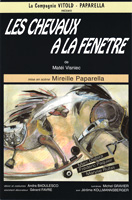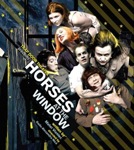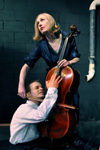
HORSES AT THE WINDOW
Editions Crater, 1996
Editions Espace d’un Instant, Paris 2010
Translated from the French by Alison Sinclair
at least one man and one woman
An absurdist journey through three centuries of war and destruction: It’s 1699. A Son leaves his anxious Mother to go off to war. His Mother is informed of his mysterious death by a mysterious Messenger bearing red carnations. It’s 1745. A Father, in a wheel-chair, and his Daughter banter bitterly, in the same kitchen. The Father goes off to his bedroom and the mysterious Messenger appears, again with red carnations, to inform her that her Father has gone mad fighting in battle. It’s 1815. In the same kitchen, a Husband/Soldier is dressing for battle as the Wife prepares the table for a sumptuous meal as he recreates the battle on the dining room table and rushes off to the war. The same Messenger arrives, carnations in hand, to report his death by trampling. As he recounts the waste of the Husband leading his soldiers to battle & then trampled to death by them in their fervor, a rain of boots fall on the Wife and ever-returning Messenger, who reveals he is the ever-dying soldier.
CHARACTERS IN THE PLAY :
THE SON
THE MOTHER
THE FATHER
THE DAUGHTER
THE HUSBAND
THE WIFE
THE MESSENGER
The female characters can be all played by the same actress. THE SON, THE FATHER, THE HUSBAND (and even THE MESSENGER) can be played by the same actor.
THE MESSENGER enters in a follow spot. He comes downstage and sets up a music stand. He takes several papers out of his pocket, unfolds then and puts them on the stand. He takes up his drum.
THE MESSENGER:
(Drums.)
The year sixteen hundred and ninety nine.
(Drums.)
The Peace of Carlowitz.
(Drums.)
Austria takes Croatia and Silesia.
(Drums.)
Prussia takes the Dukedom of Goldern.
(Drums.)
Spain takes the Dukedoms of Parma and Piacenza.
(Drums.)
France takes Alsace and Lorraine.
(Drums.)
Russia takes Georgia, The City of Ahaltin and the Khan's lands of Erevan and Nahicevan.
(Drums.)
England takes the Ionian Islands.
THE MESSENGER exits. The light increases. Out of the dimness, a room with a window appears. In the room, a ragged armchair and a ragged suitcase. A tap fixed to the wall. At long intervals, water drips from the tap.
THE SON stands at the window, dressed in military uniform. THE MOTHER brings him his jacket. THE SON puts on his jacket.
THE MOTHER: Does it fit?
THE SON: Yes.
THE MOTHER: It's not too tight?
THE SON: No.
THE MOTHER: The sleeves seem rather long. Don't you think they are rather long?
THE SON: No.
THE MOTHER: Turn round! Are you sure it's not too tight? I have a feeling it's too tight.
THE SON: It's not too tight.
THE MOTHER: Anyway, do it up! It seems to me that the buttons are rather loose. Don't you think the buttons are rather loose
THE SON: Just now a horse passed by.
THE MOTHER: Buttons must not be sewn too tightly. The tighter you sew them the quicker they undo.
THE SON: It was red with black markings. Can that be?
THE MOTHER: Have you eaten?
THE SON: No.
THE MOTHER: Then you shouldn't have put your jacket on. You should eat first, then put your jacket on.
THE SON: Yes.
THE MOTHER: Come and eat. Be careful not to make crumbs. Crumbs always fall between the floorboards. In every crack between the floorboards there are hundreds of crumbs.
THE SON: (sitting at the table, chewing blankly)
I won't make crumbs.
THE MOTHER: (fetching another ragged suitcase and filling it with THE SON's things)
Suitcase. In the suitcase, things must be kept in strict order. Things must be piled neatly, not thrown in. First, pack the large items you won't need straight away, then pack the large items you will need straight away. Next, pack the small items you won't need straight away, and finally, pack the small items you will need straight away. Having done all this, pull the straps and click the locks... like so...
(Click! Click!)
Did you hear that? The locks of a well packed suitcase produce a sweet, harmonious sound.
THEE SON: (oblivious to THE MOTHER's words, following his obsession)
The horse is back. I have the feeling it's hovering round the window. Can that be?
THE MOTHER: Socks. Socks must be kept with handkerchiefs. A handkerchief for each pair of socks, and vice versa. No one can survive without handkerchiefs and socks. Promise me you'll wash out a handkerchief and a pair of socks every evening.
THE SON: The horse is mad, honestly. It keeps looking behind it as though it were waiting for a cart.
THE MOTHER: The suitcase must never be over packed. Over packing the suitcase may embarrass those around you.
THE SON: (agitatedly) The horse has stopped and is looking straight at us. Should we close the window?
THE MOTHER: Have you finished? If you've finished you may drink a glass of water. There's boiled water in the fridge.
THE SON: The horse is looking straight at me. When someone looks straight at me do they actually see me?
THE MOTHER: You ate too quickly. It's not good to eat quickly. When you eat quickly you make lots of crumbs. Have you made crumbs?
THE SON: No.
THE MOTHER: I think I heard some crumbs fall. I think a real man doesn't need to make crumbs. A real man needs to eat quietly, to eat everything and to not make crumbs. Crumbs, if they fall between the floorboards, can never be gotten out. That's why most floors smell horrible.
THE SON: His master has come. Now they are together. The horse is happy.
THE MOTHER: Do you want more water? It's not good to drink too much water anyway. A real man doesn't go about with a stomach full of water.
THE SON: They are playing. I think they're crazy, the pair of them. Really, that horse is a sly one.
THE MOTHER: Boots. You must never leave your boots dirty overnight or they'll fall on your head. Dirt destroys the leather, corrodes everything, erodes everything. And don't wander around in the rain. Rain drops are in fact very dirty.
THE SON: I heard that yesterday morning the horses took over the abattoir. Can that be?
THE MOTHER: Soap must always be kept in its box, in the dark. It must never be left in the light or it'll go off, won't it? Besides if you wash yourself with stale soap, what's the use of washing at all? Wet towels must never be folded. Nothing weighs heavier than a wet folded towel.
THE SON: There's the cart now.
THE MOTHER: Sugar. Sugar must never be kept in paper bags. Any paper bag will have a tiny hole in it through which millions of grains of sugar can trickle. Teaspoons. Teaspoons must be wiped thoroughly after being removed from the teacup. Teaspoons rust very quickly, that's why they should be dried immediately. It's very important that your teaspoon should not rust too soon.
THE SON: It's raining. I think he'll harness the horse anyway.
THE MOTHER: Shirts. Shirts become saggy after just two days' wear. After three days the shirt sticks to the skin. When the shirt sticks to the skin it should be taken off for good. When it rains the skin sticks to the flesh. After three days the flesh will have a rancid smell. Don't forget, the smell of rancid flesh is fatal to a man. Watch your step, the air is full of smoke and the streets are full of puddles. When someone smiles at you in the street, respond with a laugh. Lend nothing, not even a little thing like a safety pin. If someone calls to you in the street don't turn your head... There are thousands of people with the same name as you...
THE SON: The cart is ready. It won't be long before dark.
THE SON stands and goes with heavy step to the door.
THE MOTHER: (quickening the rhythm, speaking louder and louder, gradually entering a verbal trance)
Wait! Muffler! The muffler must be long and narrow... Only that way can you wrap it adequately around your neck... The collar must be soft and warm.... Never speak with the wind in your face... Don't point with your finger, don't hit the table with your fist... Don't drop playing cards and don't crumple banknotes! Don't walk barefoot on stone floors... Don't fall asleep with your mouth open... When you dream of frogs do all you can to wake up.
(She clings more and more desperately to THE SON.)
Write me a postcard every day, take care of your elbows and knees, don't think of the red horse with the black markings... Don't go near the horses, don't hold out your hand to touch them... The horses have already taken over the abattoir yard... Wait! Take this money but don't keep it all in one pocket...
THE SON: Mother, my pockets are sewn up...
THE SON exits dragging the suitcase. THE SON exits but has forgotten to put his boots on.
THE MOTHER grabs them and throws herself at the window.
THE MOTHER: Wait! Wait!
THE MOTHER throws THE SON the boots, one after the other. At the same time someone knocks loudly at the door. THE MOTHER goes wearily to the door and opens it.
Enter THE MESSENGER with a bunch of carnations in his hand; around his neck he wears the boots that THE MOTHER has just thrown out of the window.
THE MESSENGER: (cheerfully) Good day, Madam, may I offer you these flowers
THE MOTHER: What flowers are they?
THE MESSENGER: Carnations, Madam. I picked them with my own hand from the regimental lawn.
THE MOTHER: Thank you, Sir. Put them as far away from me as possible. The smell of carnations makes me sick.
THE MESSENGER: May I put them under the table?
THE MOTHER: I'd rather you put them in that suitcase.
THE MESSENGER opens the suitcase which is already filled with carnations. He stuffs his flowers on top of the others, closes the suitcase – click! clack! – and sits on it.
THE MOTHER: You may sit on the suitcase if you like.
THE MESSENGER: Thank you, Madam. I think I will sit for a while.
THE MOTHER: Tell me, please, are you the man with the horse?
THE MESSENGER: (playing from time to time with the suitcase locks: click! clack!) Yes, Madam, I'm the man with the horse.
THE MOTHER: So it was you just now hovering around the windows!
THE MESSENGER: It was us, Madam.
THE MOTHER: And do you consider it right to keep your horse out in the rain? I think one should never keep animals out in the rain, except for fishes, of course.
THE MESSENGER: I'm glad you think that. You see, I'm from the regiment, I often pass by your window. Our opinion is that windows represent a reliable opportunity to establish contact with reality.
THE MOTHER: Sir, you are about to give me some bad news.
THE MESSENGER: (click! clack!) Yes, Madam... But I don't know how to begin.
THE MOTHER: Has anything happened to my son?
THE MESSENGER: Yes, Madam. That's the very reason I was sent here, in order to prepare you spiritually. It's not an easy task to prepare someone spiritually. Put yourself in my position... Other people bring bad news quite bluntly… But not me, Madam, I have always proceeded with tact and delicacy. And I've always managed to break the most terrible news in the subtlest way possible.
(Click! Clack!)
I have never yet failed this moment. Thanks to my aforesaid subtle manner, many people have been grateful to me... I have spared them, if I may say so, thousands of tears... Sometimes I have even managed to turn such circumstances into an opportunity for hope, and, even good humour... I 'm sure that, had I only known how to begin, we'd have been having a nice and pleasant chat by now... I have often brought a beam of light into people's homes due to my pleasant manner... I have won many friends and returned to many homes with pleasure.
THE MOTHER: Cut with it! My son is dead, isn't he?
THE MESSENGER: Yes, Madam. You see, I know the human soul. I know exactly when to chose the right moment, that unique and singular moment when I permit myself, for a split second, to touch the wound.
(Click! Clack!)
Please believe me, there is no one can touch the wound more delicately than I, in a lighter and more sensitive way than I... Sometimes I accomplish real feats of skill, my touch is so discreet and tender that the wound almost heals.
THE MOTHER: (Desperate, wandering about the room)
Oh I knew it... I knew that it would come to this.
THE MESSENGER: In fact, I'm going to tell you everything. Yes I want to tell you everything... Because my great secret lies in the way I know how to share another's sorrow... Because I, Madam, have an immense capacity to experience sorrow... That's why whenever I bring terrible news, the sorrow on my face has such a profound affect that those who are hit with the real misfortune are the first to feel compelled to comfort me... Look at me, Madam, take a good look at me, barefoot with my boots soaking wet... For I, Madam, would never leave my boots dirty overnight...
In concert with the Romanian Cultural Institut in New York and the French Cultural Services in Chicago, Trap Door Theatre is proud to present Matei Visniec's Horses at the Window. Horses at the Window is a penetrating, playful examination of the women who wait patiently at home for their fighting men. A mother, daughter and wife say goodbye to their men, when a messenger appears with flowers, compliments and death portents. A charming treacherous guide, the Messenger's seductive infiltration into their lives is an allegory for the quiet way the idea of war can become commonplace in society. Trap Door's production of Horses at the Window has been invited to Romania to perform in the 2009 Arad-Fun Underground Festival, the International Sibiu Festival and The Teatrul de Comedie in Bucharest (Trap Door Theatre, Chicago)
Chicago Stage Review, Wed 8 Apr, 2009
Once again Trap Door Theatre so completely suspends conventional reality that we are drawn in, as if falling through a psychological wormhole of exaggerated sensibilities, and then left reeling as we re-enter the real world.
Horses at the Window subversively deconstructs the trivialized suffering of those left to patiently wait for men in battle. Whenever something that is quite simply wrong is fed to the masses as something that is acceptable or right, the result is emotional and even situational chaos for those on the loosing end of the equation. Playwright Matei Visinec articulates this with a dramatic vocabulary consisting of whimsical and unpredictable absurdity.
“I think that no animals should be left out in the rain, except fishes of course.” Muses the mother as she clings to the unrelated absurdity of obvious observations rather than face the loss at hand.
Director Radu Alexandru-Nica delivers this script with a thrilling physicality that borders on exhausting to watch, which must mean exhausting to execute, and an intimately clear vision of Visinec’s obscure approach. Every scene is precisely choreographed madness with a striking purpose. It is fluid and concentrated lunacy. The result is an assaulting and entertaining adventure into the world of bureaucratic double-talk and propagandized lives.
The exceptional cast embodies the stylized characters with insane intensity, profound dedication and focused precision. All are remarkable in their own right but the women carry the weight of contemplative loss. The actors portray this beautifully and to chilling effect. Holly Thomas’s inclusion of live cello music to her characterization renders lovely additional depth and melancholy.
Sound designers Bob Roskos and Sam Lewis create the perfect soundtrack to the profound insanity. Delicate and sophisticated, the music accents the action and sets the appropriate tones with beguiling and exciting effectiveness.
Horses at the Window, described as “a comedic ballet of futile martyrdom and overzealous patriotism,” is a haunting assault as well as a theatrical extravaganza, the kind of twisted tasty treat that Trap Door Theatre has mastered. You expect nothing short of the unexpected from this fearlessly experimental company that continues to forge a path through the warped and abnormal.



Le Jodel - Théâtre des Célestins Lyon, France, 1992, directed by Pascal Papini
Radio production, France Culture, 1996, directed by Michel Sidorof
Company Vitold-Paparella - Théâtre des Cinquante, Paris, 1996, directed by Mireille Paparella
Teatrul Mic, Bucharest, Romania, 1994, directed by Nicolae Scarlat
Osobniac Theater, Saint-Petersbourg, Russia, 1997, directed by Volia Vaha
Trap Door Theater, Chicago, USA, 2009, directed by Radu Alexandru Nica
Romanian
French
Italian (translation Esterina Cantoni)
Japanese (translation Hiroko Kawaguchi)
Persian (translation Tinouche Namjou)
Russian (translation Anastasia Starostina)
Hungarian (translation Tapasztó Ernó)
webdesign : © Andra Badulesco 2010